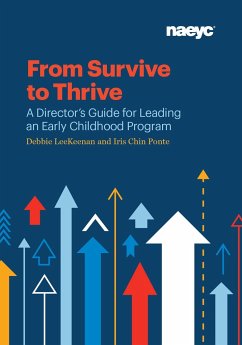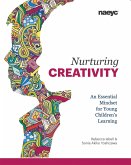Debbie Leekeenan, Iris Chin Ponte
From Survive to Thrive
A Director's Guide for Leading an Early Childhood Program
Debbie Leekeenan, Iris Chin Ponte
From Survive to Thrive
A Director's Guide for Leading an Early Childhood Program
- Broschiertes Buch
- Merkliste
- Auf die Merkliste
- Bewerten Bewerten
- Teilen
- Produkt teilen
- Produkterinnerung
- Produkterinnerung
Theory meets practical tips in this guide for leaders of early childhood programs
Andere Kunden interessierten sich auch für
![Nurturing Creativity Nurturing Creativity]() Rebecca IsbellNurturing Creativity28,99 €
Rebecca IsbellNurturing Creativity28,99 €![Creating a Culture of Reflective Practice Creating a Culture of Reflective Practice]() Anne Marie CoughlinCreating a Culture of Reflective Practice30,99 €
Anne Marie CoughlinCreating a Culture of Reflective Practice30,99 €![Help Your Child Thrive at School Help Your Child Thrive at School]() Lubaina AliHelp Your Child Thrive at School17,99 €
Lubaina AliHelp Your Child Thrive at School17,99 €![Leadership and Management in the Early Years: From Principles to Practice Leadership and Management in the Early Years: From Principles to Practice]() Caroline JonesLeadership and Management in the Early Years: From Principles to Practice35,99 €
Caroline JonesLeadership and Management in the Early Years: From Principles to Practice35,99 €![The Gift of Playful Learning The Gift of Playful Learning]() Nadia Kenisha BynoeThe Gift of Playful Learning32,99 €
Nadia Kenisha BynoeThe Gift of Playful Learning32,99 €![Ethics and the Early Childhood Educator Ethics and the Early Childhood Educator]() Stephanie FeeneyEthics and the Early Childhood Educator26,99 €
Stephanie FeeneyEthics and the Early Childhood Educator26,99 €![Creating a Space to Grow Creating a Space to Grow]() Gail Ryder RichardsonCreating a Space to Grow42,99 €
Gail Ryder RichardsonCreating a Space to Grow42,99 €-
-
-
Theory meets practical tips in this guide for leaders of early childhood programs
Produktdetails
- Produktdetails
- Verlag: National Association for the Education of Young Children
- Seitenzahl: 176
- Erscheinungstermin: 31. Juli 2018
- Englisch
- Abmessung: 251mm x 175mm x 10mm
- Gewicht: 454g
- ISBN-13: 9781938113369
- ISBN-10: 1938113365
- Artikelnr.: 53346838
- Herstellerkennzeichnung
- Libri GmbH
- Europaallee 1
- 36244 Bad Hersfeld
- gpsr@libri.de
- Verlag: National Association for the Education of Young Children
- Seitenzahl: 176
- Erscheinungstermin: 31. Juli 2018
- Englisch
- Abmessung: 251mm x 175mm x 10mm
- Gewicht: 454g
- ISBN-13: 9781938113369
- ISBN-10: 1938113365
- Artikelnr.: 53346838
- Herstellerkennzeichnung
- Libri GmbH
- Europaallee 1
- 36244 Bad Hersfeld
- gpsr@libri.de
Debbie LeeKeenan is an early childhood consultant, lecturer, and author. She was director and lecturer at the Eliot-Pearson Children's School, the laboratory school affiliated with the Eliot-Pearson Department of Child Study and Human Development at Tufts University in Medford, MA, from 1996 to 2013. She has also held academic teaching positions at Lesley University in Cambridge, MA, and the University of Massachusetts Amherst. Her work has been published in numerous journals and books, including Young Children, Theory Into Practice, and the first edition of The Hundred Languages of Children: The Reggio Emilia Approach to Early Childhood Education. Her most recent book, coauthored with Louise Derman-Sparks and John Nimmo, is Leading Anti-Bias Early Childhood Programs: A Guide for Change. Debbie holds a master's degree in education from the University of New Mexico. Her areas of expertise include anti-bias education, early childhood education, teacher preparation, inclusive special education, curriculum development, teacher inquiry, family engagement, leadership development, professional learning communities, and public school partnerships. Debbie has received a number of awards for her outstanding commitment to young children and the early childhood profession, record of distinguished professional achievement, and work in diversity, including the Tufts University Arts and Sciences Faculty/Staff Multicultural Service Award in 2003; the Tufts Bridge Builder Distinction Award in 2009; and the Abigail Eliot Award in 2015.
Preface
Chapter 1: What Does It Mean to Be a Director?
Chapter 2: Program Context and Culture
Chapter 3: Achieving and Maintaining Program Quality
Chapter 4: Budget and Finances
Chapter 5: Program Curriculum
Chapter 6: Observation, Assessment, and Documentation
Chapter 7: Staffing
Chapter 8: Working with Families
Chapter 9: Center Enrollment
Conclusion: Balancing Act-Managing Your Role as the Director
References
Acknowledgments
About the Authors
Chapter 1: What Does It Mean to Be a Director?
Chapter 2: Program Context and Culture
Chapter 3: Achieving and Maintaining Program Quality
Chapter 4: Budget and Finances
Chapter 5: Program Curriculum
Chapter 6: Observation, Assessment, and Documentation
Chapter 7: Staffing
Chapter 8: Working with Families
Chapter 9: Center Enrollment
Conclusion: Balancing Act-Managing Your Role as the Director
References
Acknowledgments
About the Authors
Preface
Chapter 1: What Does It Mean to Be a Director?
Chapter 2: Program Context and Culture
Chapter 3: Achieving and Maintaining Program Quality
Chapter 4: Budget and Finances
Chapter 5: Program Curriculum
Chapter 6: Observation, Assessment, and Documentation
Chapter 7: Staffing
Chapter 8: Working with Families
Chapter 9: Center Enrollment
Conclusion: Balancing Act-Managing Your Role as the Director
References
Acknowledgments
About the Authors
Chapter 1: What Does It Mean to Be a Director?
Chapter 2: Program Context and Culture
Chapter 3: Achieving and Maintaining Program Quality
Chapter 4: Budget and Finances
Chapter 5: Program Curriculum
Chapter 6: Observation, Assessment, and Documentation
Chapter 7: Staffing
Chapter 8: Working with Families
Chapter 9: Center Enrollment
Conclusion: Balancing Act-Managing Your Role as the Director
References
Acknowledgments
About the Authors









